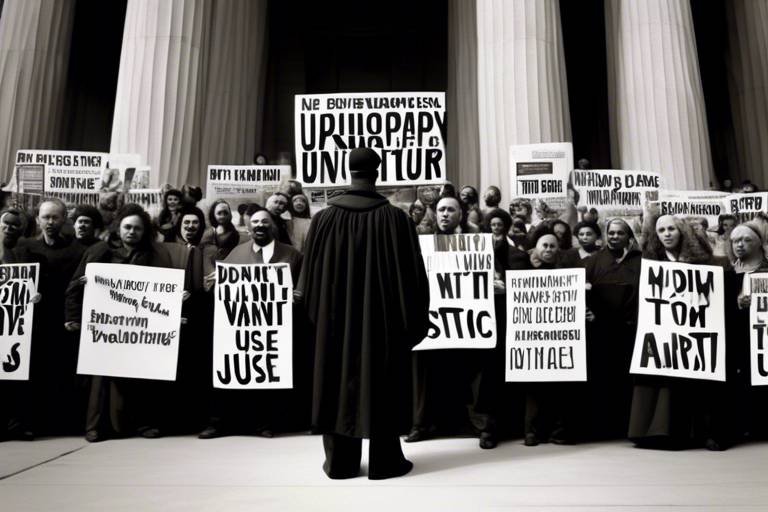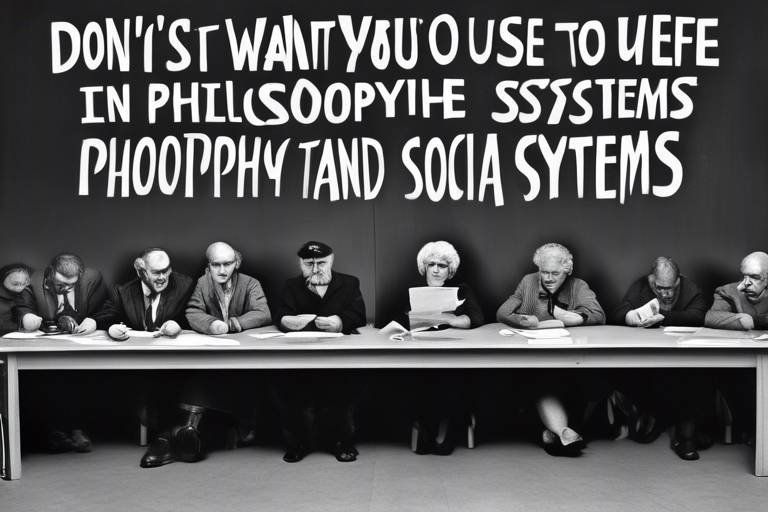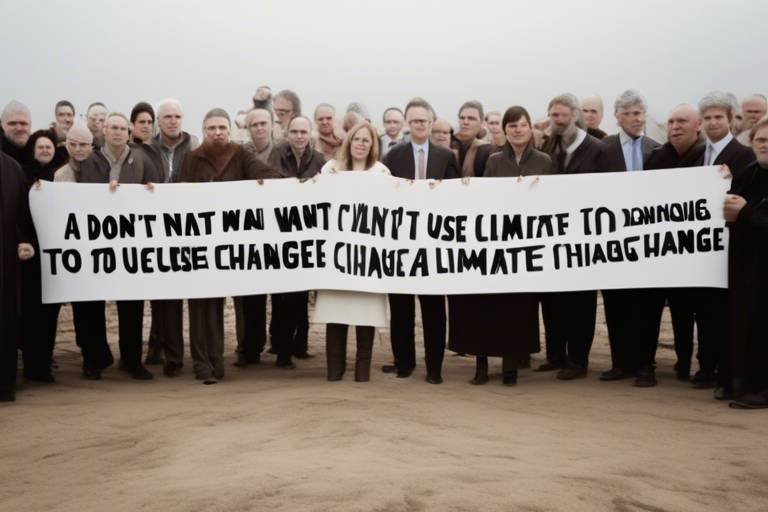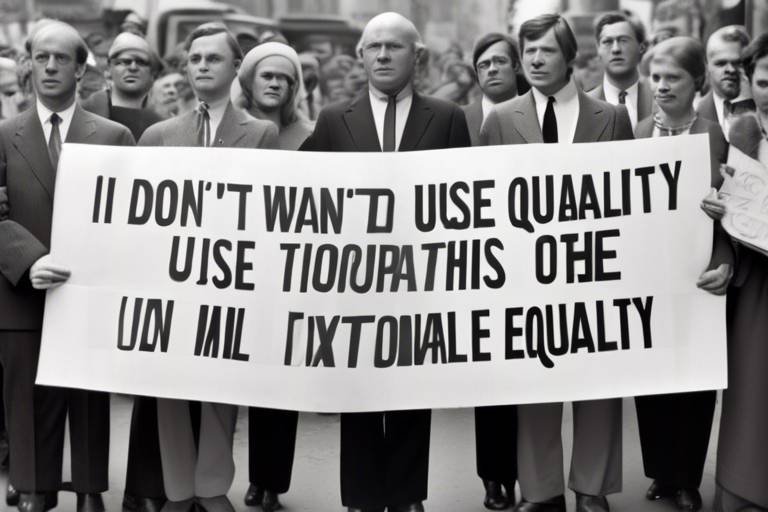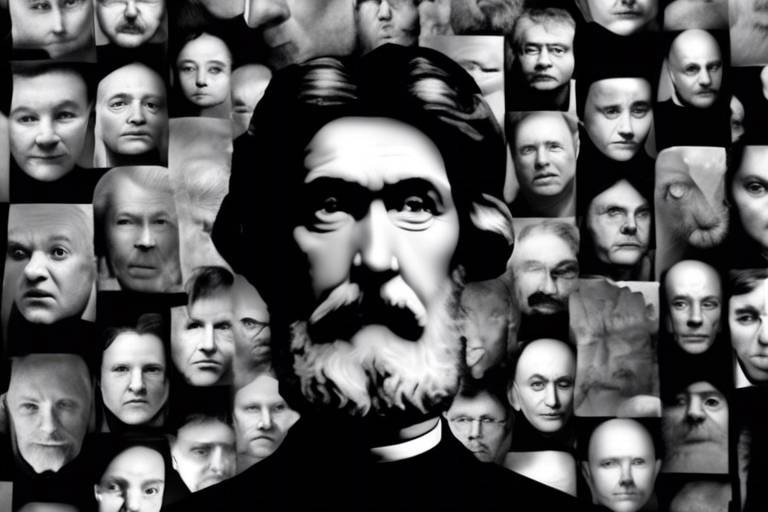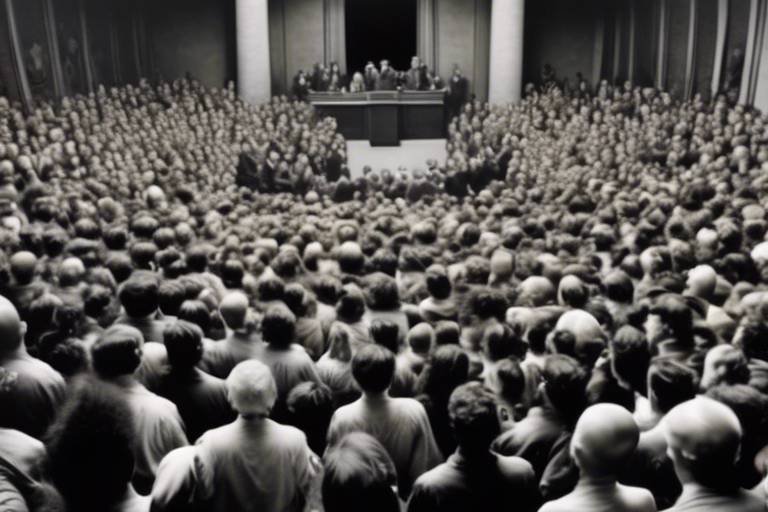Philosophy and Politics: Unraveling Justice
Welcome to the fascinating intersection of philosophy and politics, where the concept of justice reigns supreme! In a world filled with complexities, the quest for justice is not just a lofty ideal; it's a necessity that shapes our societies. Whether you’re pondering the fairness of a law or the equity of a political system, understanding justice is crucial. This article will dive deep into the intricate relationship between philosophy and politics, focusing on how various philosophical theories influence our perception of justice and the structure of our political systems. Are you ready to unravel the layers of justice and discover what it truly means to create a just society? Let’s embark on this enlightening journey!
To grasp the essence of justice, we must first explore its philosophical foundations. Justice can be viewed through multiple lenses, each offering a unique definition that shapes our understanding of fairness and equality. For some, justice means giving everyone their due, while for others, it’s about ensuring equal opportunities for all. This divergence in definitions leads to rich discussions about what it means to be just. Imagine justice as a tapestry woven from various threads—each thread representing a different perspective. The challenge lies in finding a balance among these perspectives to create a cohesive understanding of justice that resonates with our societal values.
Throughout history, numerous philosophers have grappled with the concept of justice, leaving a profound impact on modern political thought. From the ancient musings of Plato to the contemporary theories of John Rawls, each thinker has contributed to our understanding of justice in significant ways. Their ideas not only provide context for contemporary debates but also challenge us to think critically about governance and the role of justice within it. By examining their philosophies, we can better appreciate the evolution of justice as a concept and its implications for our political systems.
Plato envisioned an ideal state where justice is achieved through the rule of philosopher-kings, individuals who possess both wisdom and virtue. He believed that only those who understand the true nature of good can govern justly. In this state, the pursuit of the common good is paramount, and justice is seen as harmony among the different classes of society. Plato’s allegory of the cave illustrates how individuals must emerge from ignorance to attain enlightenment, a journey that reflects the philosophical underpinnings of justice. His vision prompts us to ask: can we truly achieve justice without enlightened leadership?
Moving from Plato to Aristotle, we find a different approach to justice rooted in virtue ethics. Aristotle emphasized the importance of moral character and believed that justice is about achieving a balance between individual rights and the common good. He argued that a just society is one where citizens strive for virtue, and through their actions, contribute to the overall well-being of the community. This perspective challenges us to consider our roles as active participants in fostering a just society. Are we cultivating virtues that promote justice in our daily lives?
Utilitarianism offers a consequentialist view of justice, focusing on the greatest good for the greatest number. This theory, championed by philosophers like Jeremy Bentham and John Stuart Mill, evaluates the morality of actions based on their outcomes. While this perspective provides a pragmatic approach to justice, it raises important questions: does the end justify the means? Can we overlook the rights of the minority in pursuit of the majority’s happiness? These questions highlight the strengths and weaknesses of utilitarianism in political contexts, prompting ongoing debates about its applicability in real-world situations.
In contemporary discourse, theorists like John Rawls and Robert Nozick have challenged traditional views of justice, introducing new frameworks that inspire vigorous debate. Rawls' theory of justice as fairness advocates for principles that ensure equality and protect the least advantaged members of society. On the other hand, Nozick's libertarian approach emphasizes individual rights and minimal state intervention. These contrasting theories provide fertile ground for discussion about what a just society should look like and how best to achieve it. As we navigate these modern theories, we must ask ourselves: how do we balance individual rights with the needs of the community?
Different political systems interpret and implement justice in varied ways, reflecting their underlying values and priorities. In democratic societies, justice is often linked to the principles of equality and participation, where laws are designed to protect the rights of all citizens. Conversely, authoritarian regimes may impose justice through control and suppression, prioritizing order over individual freedoms. This section will explore these dynamics, revealing how justice is not a one-size-fits-all concept but rather a reflection of the political landscape.
Social justice movements have emerged as powerful advocates for equity and rights, challenging existing structures and demanding change. From civil rights movements to contemporary advocacy for gender and racial equality, these movements are grounded in philosophical principles that emphasize justice and fairness. They play a crucial role in shaping political change, urging society to confront injustices and strive for a more equitable future. The impact of these movements raises an important question: how can we support and amplify the voices calling for justice in our communities?
Justice is perceived differently across cultures and nations, influenced by historical, social, and political contexts. This section examines how global perspectives shape international relations and the quest for universal justice standards. As we navigate an increasingly interconnected world, understanding these diverse viewpoints is essential for fostering dialogue and cooperation. Can we find common ground in our pursuit of justice, or are our differences too great to bridge?
- What is the definition of justice? Justice can be defined as the principle of moral rightness, fairness, and equity in the treatment of individuals within a society.
- How do philosophers influence political systems? Philosophers provide foundational theories that shape our understanding of justice, which in turn informs the laws and political structures of societies.
- What role do social movements play in achieving justice? Social movements advocate for change and equity, raising awareness of injustices and pushing for reforms within political systems.

The Nature of Justice
Understanding justice is like peeling an onion; each layer reveals deeper insights into what it means to be fair and equitable in society. At its core, justice is about balance—the idea that everyone deserves to be treated with respect and dignity. But what does that really mean? Different philosophical traditions offer varying definitions of justice that shape our perceptions of fairness and equality. For instance, some might argue that justice is about giving everyone what they deserve, while others might define it as ensuring that everyone has equal opportunities to succeed. This divergence in definitions leads us to ask: Is justice merely a social construct, or is it an inherent principle that transcends cultural boundaries?
One of the most widely accepted definitions of justice is the concept of distributive justice, which focuses on the fair allocation of resources. This idea stems from the belief that society should distribute wealth, opportunities, and privileges in a manner that is fair and just. However, the challenge lies in determining what "fair" truly means. Is it equal distribution for everyone, or should it be based on individual needs and contributions? This ongoing debate is central to discussions about social policies, taxation, and welfare systems.
Another perspective is retributive justice, which emphasizes punishment for wrongdoing. This approach raises important questions about the purpose of punishment: Is it to deter future crimes, rehabilitate the offender, or simply to avenge the victim? Many political systems grapple with these questions, seeking a balance between punishment and rehabilitation in their justice systems. The implications of these definitions are profound, affecting everything from criminal justice policies to social welfare programs.
Moreover, the philosophical foundations of justice extend beyond mere definitions; they also inform our moral compass. For example, the idea of justice as a virtue suggests that individuals should strive to act justly in their daily lives. This notion aligns closely with Aristotle's virtue ethics, which emphasizes the importance of moral character in achieving a just society. According to Aristotle, a just person is one who acts in accordance with virtue, promoting the common good rather than solely pursuing personal interests.
In contemporary discussions, the concept of social justice has gained significant traction. This perspective focuses on addressing systemic inequalities and advocating for the rights of marginalized groups. It challenges the traditional views of justice by highlighting the need for societal change to achieve true fairness. Social justice movements are often rooted in the belief that justice should not only be about individual rights but also about collective well-being.
Ultimately, the nature of justice is complex and multifaceted, shaped by historical context, cultural values, and philosophical debates. It invites us to reflect on our own beliefs and actions, pushing us to strive for a society where justice is not just an abstract concept, but a lived reality for all. As we continue to explore this intricate relationship between philosophy and politics, we must ask ourselves: How can we contribute to a more just world?
- What is the difference between distributive and retributive justice?
Distributive justice focuses on the fair allocation of resources, while retributive justice emphasizes punishment for wrongdoing. - How does social justice differ from traditional views of justice?
Social justice advocates for addressing systemic inequalities and prioritizes the rights of marginalized groups, expanding the traditional focus on individual rights. - Why is understanding the nature of justice important?
Understanding justice helps us navigate social policies, ethical dilemmas, and our roles as citizens in promoting fairness and equity.

Historical Perspectives on Justice
When we think about justice, it's essential to look back at the minds that shaped our understanding of it. Throughout history, philosophers have grappled with the concept of justice, providing frameworks that continue to influence our political systems today. From ancient Greece to modern times, these thinkers have offered insights that challenge and refine our perceptions of what it means to be just. Their ideas are not just dusty old theories; they are vibrant discussions that echo in our current debates about fairness and equality.
One of the most significant figures in the history of philosophy is Plato. His work, particularly in "The Republic," presents a vision of an ideal state governed by philosopher-kings. Plato believed that true justice could only be achieved when rulers were wise enough to understand the greater good. In his view, the common good is paramount, and those in power must prioritize it above personal interests. This perspective invites us to consider: can we trust our leaders to act justly, or are they often swayed by their own desires?
Then we have Aristotle, who took a different approach. He emphasized virtue ethics, arguing that justice arises from moral character. For Aristotle, a just society is one where citizens strive for virtue and act in accordance with it. This leads us to ponder the role of individual responsibility in achieving justice. Are we, as members of society, doing enough to cultivate our moral character, or are we merely spectators in the quest for justice?
As we move through history, we encounter the consequentialist views of Utilitarianism, championed by thinkers like Jeremy Bentham and John Stuart Mill. They posited that the right action is the one that produces the greatest good for the greatest number. This idea poses a compelling question: does the end justify the means? While utilitarianism offers a practical approach to justice, it also raises ethical dilemmas. For instance, if sacrificing a few can benefit many, is that truly just?
Fast forward to the modern era, and we find ourselves in the midst of debates sparked by philosophers like John Rawls and Robert Nozick. Rawls introduced the idea of "justice as fairness," advocating for a system that ensures basic rights and opportunities for all, particularly the least advantaged. On the other hand, Nozick's libertarian perspective emphasizes individual rights and property ownership, challenging the redistribution of wealth. Their contrasting views fuel ongoing discussions about the balance between freedom and equality in our political systems.
It's fascinating to see how these historical perspectives on justice have laid the groundwork for contemporary debates. They remind us that justice is not a static concept but a dynamic conversation that evolves with society. Each philosopher offers a unique lens through which we can examine our systems and question our values. So, as we navigate the complexities of justice today, let’s keep these historical dialogues in mind. They not only enrich our understanding but also guide us in our pursuit of a just society.
- What is the main focus of Plato's concept of justice? Plato's concept revolves around the idea of the philosopher-king, who rules in the interest of the common good.
- How does Aristotle's view of justice differ from Plato's? Aristotle emphasizes virtue ethics, focusing on moral character and individual responsibility rather than the overarching rule of a wise leader.
- What are the strengths of Utilitarianism in relation to justice? Utilitarianism seeks to maximize overall happiness, which can lead to practical solutions for societal issues, but it raises ethical questions about individual rights.
- How do modern theories of justice differ from historical perspectives? Modern theories often challenge traditional views by incorporating ideas of fairness, rights, and the role of government in ensuring justice.

Plato's Ideal State
Plato's vision of an ideal state is not just a blueprint for governance; it's a profound exploration of justice and morality that resonates through the ages. In his seminal work, "The Republic," Plato introduces the concept of the philosopher-king, a ruler who possesses both wisdom and virtue. But what does this really mean for justice? Plato argues that only those who truly understand the essence of goodness should hold power. This idea challenges us to think critically about who we allow to govern and the qualities that define a just leader.
In Plato's ideal state, society is structured into three distinct classes: the rulers, the auxiliaries, and the producers. Each class has its own role, contributing to the harmony and stability of the state. The rulers, or philosopher-kings, are tasked with making decisions for the common good, while the auxiliaries serve as guardians, enforcing laws and protecting the state. The producers, comprising farmers, artisans, and merchants, provide the necessary goods and services. This tripartite structure reflects Plato's belief in specialization, where each individual plays to their strengths, thus fostering a more just society.
Plato's ideal state also emphasizes the importance of education and the cultivation of virtue. He believed that a well-ordered society could only exist if its citizens were educated in philosophy, mathematics, and the arts, allowing them to grasp the higher truths of existence. Education, in this context, is not merely about acquiring knowledge; it’s about shaping moral character. Plato famously stated, "The direction in which education starts a man will determine his future in life." This notion underscores the role of education in achieving justice, as it empowers individuals to recognize their responsibilities towards others and the state.
However, the practicality of Plato's ideal state has been a subject of debate among philosophers and political theorists. Critics argue that his model is overly utopian and disregards the complexities of human nature. Can we truly expect individuals to rise above personal interests for the sake of the common good? This question leads us to consider the inherent tensions between individual freedom and collective responsibility. Plato’s vision, while inspiring, forces us to confront the challenging reality of governance and the pursuit of justice in an imperfect world.
In conclusion, Plato's ideal state serves as a powerful framework for understanding justice. It invites us to reflect on the qualities we value in our leaders and the societal structures that promote or hinder justice. As we navigate our contemporary political landscape, the lessons from Plato's philosophy remain relevant, reminding us that the quest for a just society is an ongoing journey, one that requires wisdom, virtue, and a commitment to the common good.
- What is Plato's concept of the philosopher-king? Plato believed that the best rulers are those who possess wisdom and virtue, making decisions for the common good rather than personal gain.
- How does Plato's ideal state relate to modern governance? While Plato's model may seem utopian, it raises important questions about leadership qualities and the role of education in fostering a just society.
- What are the three classes in Plato's ideal state? The three classes are rulers (philosopher-kings), auxiliaries (guardians), and producers (farmers, artisans, merchants), each contributing to the state's harmony.

Aristotle's Virtue Ethics
Aristotle's virtue ethics presents a compelling framework for understanding justice, one that is deeply intertwined with the concept of moral character. Unlike other ethical theories that may focus solely on rules or consequences, Aristotle emphasizes the importance of developing virtuous traits in individuals. He posits that a just society is built upon the foundation of virtuous citizens, who act in accordance with their moral compass. This perspective invites us to consider: what does it mean to be virtuous, and how does this relate to our pursuit of justice?
At the heart of Aristotle's philosophy is the idea of the Golden Mean, which suggests that virtue lies between two extremes of excess and deficiency. For instance, courage is a virtue that exists between the extremes of recklessness and cowardice. By striving for balance in our actions and emotions, we can cultivate the virtues necessary for a just society. Aristotle believed that virtues are not innate; rather, they are developed through practice and habituation. This means that individuals must actively engage in virtuous actions to become virtuous people.
Moreover, Aristotle's view of justice is inherently relational. He argues that justice is about giving each individual their due, which is often interpreted as treating people equitably based on their contributions and needs. This principle can be broken down into two main types of justice:
- Distributive Justice: This pertains to the fair allocation of resources and honors among members of society, ensuring that individuals receive what they deserve based on their merit.
- Retributive Justice: This focuses on the appropriate response to wrongdoing, emphasizing the importance of proportionate punishment that reflects the severity of the offense.
In Aristotle's view, the cultivation of virtue is essential not only for individual moral development but also for the health of the political community. A society composed of virtuous individuals is more likely to foster a sense of justice and community well-being. This brings us to the role of citizens in achieving a just society. According to Aristotle, active participation in civic life is crucial. Citizens should engage in political discourse, contribute to the common good, and hold one another accountable to virtuous standards.
In conclusion, Aristotle's virtue ethics provides a profound lens through which we can examine justice. By focusing on the character of individuals and the importance of moral virtues, we can better understand the foundations of a just society. As we navigate the complexities of modern political systems, Aristotle's insights remind us that justice is not merely a legalistic concept but a deeply personal and communal endeavor.
- What is the main idea of Aristotle's virtue ethics? Aristotle's virtue ethics emphasizes the importance of moral character and the development of virtues as essential for achieving justice and the common good.
- How does the concept of the Golden Mean relate to justice? The Golden Mean suggests that virtues exist between extremes, and by finding balance in our actions, we can contribute to a more just society.
- Why is civic engagement important in Aristotle's philosophy? Active participation in civic life is crucial for individuals to develop virtues and for the community to foster justice and accountability.

Utilitarianism and Justice
Utilitarianism, a philosophical theory championed by thinkers like Jeremy Bentham and John Stuart Mill, presents a compelling yet contentious view of justice. At its core, utilitarianism posits that the moral worth of an action is determined by its contribution to overall happiness or utility. In simpler terms, it advocates for the idea that the best action is the one that maximizes happiness for the greatest number of people. This consequentialist approach raises significant questions about justice, particularly when we consider whose happiness counts and how it is measured.
One of the most intriguing aspects of utilitarianism is its focus on outcomes rather than intentions. This means that actions are judged based on their results rather than the motives behind them. For example, if a government implements a policy that results in a net increase in happiness for the majority, but causes suffering for a minority, a utilitarian might argue that the policy is justifiable. This can lead to a moral dilemma where the rights of individuals may be sacrificed for the sake of the greater good, sparking debates about the ethical implications of such a trade-off.
To better understand this dynamic, consider the following points:
- Majority Rule vs. Minority Rights: Utilitarianism often prioritizes the happiness of the majority, which can lead to the marginalization of minority groups. This raises the question: Is it just to sacrifice the rights of a few for the happiness of many?
- Measuring Happiness: How do we quantify happiness? Different individuals and cultures may have varying definitions of what constitutes happiness, making it challenging to apply a one-size-fits-all approach to justice.
- Short-term vs. Long-term Outcomes: Utilitarianism can sometimes favor short-term gains over long-term sustainability, leading to decisions that may not be just in the broader context of societal well-being.
Despite these challenges, utilitarianism has significantly influenced political systems and policies worldwide. In many democratic societies, the principles of utilitarianism can be seen in public policy decisions, where lawmakers strive to create laws that benefit the majority. However, critics argue that this approach can lead to injustices, particularly when it ignores the needs and rights of marginalized groups.
Moreover, utilitarianism's emphasis on the collective good can sometimes conflict with other philosophical theories of justice, such as deontological ethics, which focus on the morality of actions themselves rather than their outcomes. This clash of ideologies highlights the complexity of defining justice in a political context and raises important questions about how we can create a just society that balances individual rights with the greater good.
In conclusion, while utilitarianism offers a framework for understanding justice through the lens of collective happiness, it also presents significant challenges and ethical dilemmas. As we navigate the political landscape, it becomes crucial to critically assess the implications of utilitarian principles and strive for a more inclusive approach to justice that considers the diverse needs of all individuals within society.
- What is utilitarianism?
Utilitarianism is a philosophical theory that suggests the best action is the one that maximizes happiness for the greatest number of people. - How does utilitarianism relate to justice?
Utilitarianism influences notions of justice by prioritizing outcomes that benefit the majority, often leading to debates about the rights of minorities. - What are the criticisms of utilitarianism?
Critics argue that utilitarianism can justify actions that harm individuals for the sake of collective happiness, raising ethical concerns about fairness and rights. - Can utilitarianism coexist with other theories of justice?
While utilitarianism can coexist with other theories, such as deontological ethics, tensions often arise regarding the prioritization of outcomes versus moral principles.

Modern Theories of Justice
In the landscape of contemporary political thought, have emerged as pivotal frameworks that challenge and refine our understanding of what it means to create a just society. Prominent philosophers like John Rawls and Robert Nozick have introduced ideas that provoke deep discussions about fairness, rights, and the role of the state in ensuring justice. Their contrasting views not only enrich philosophical discourse but also influence real-world policy decisions.
John Rawls, in his seminal work A Theory of Justice, proposes the concept of the original position and the veil of ignorance. Imagine a scenario where individuals are stripped of their personal biases, social status, and knowledge of their future circumstances. From this hypothetical standpoint, Rawls argues that people would naturally choose principles that ensure fairness and equality for all. This leads to his two key principles of justice: first, each person should have equal rights to the most extensive basic liberties compatible with similar liberties for others; second, social and economic inequalities should be arranged to benefit the least advantaged members of society. This approach emphasizes a collective responsibility towards those who are marginalized, making it a cornerstone of modern social justice movements.
On the other hand, Robert Nozick presents a starkly different perspective in his work Anarchy, State, and Utopia. He critiques Rawls' distributive justice framework, arguing instead for a libertarian approach that prioritizes individual rights and property ownership. Nozick's famous entitlement theory posits that justice is achieved when individuals are entitled to their holdings, provided they were acquired justly. This theory emphasizes minimal state intervention, advocating that any redistribution of wealth is inherently unjust unless it arises from voluntary transactions. Nozick's ideas challenge us to consider the implications of freedom and autonomy in discussions of justice.
These modern theories have sparked numerous debates and discussions among scholars and practitioners alike. For instance, while Rawls' theory promotes a structured approach to ensuring equity, critics argue that it may overlook the importance of individual merit and the incentives necessary for economic growth. Conversely, Nozick's emphasis on individual rights raises questions about social responsibilities and the welfare of disadvantaged groups. This ongoing dialogue reflects the complexity of justice as a concept, highlighting how philosophical theories can have profound implications for political systems and societal norms.
As we navigate these modern theories, it becomes evident that justice is not a one-size-fits-all notion. Different societies may prioritize various aspects of justice based on their unique cultural, historical, and social contexts. This leads us to consider a global perspective on justice, where the interplay of diverse philosophies shapes international norms and policies. Understanding these modern theories equips us with the tools to critically engage with contemporary issues surrounding justice, from economic disparities to human rights violations.
- What is the main difference between Rawls' and Nozick's theories of justice?
Rawls advocates for a structured approach to fairness and equality, while Nozick emphasizes individual rights and minimal state intervention. - How do modern theories of justice impact social movements?
These theories provide a philosophical foundation for advocating equity and rights, influencing the goals and strategies of social justice movements. - Can justice be universally defined?
No, justice is perceived differently across cultures, and modern theories highlight the need for context-specific interpretations.

Justice in Political Systems
Justice is a multifaceted concept that varies significantly across different political systems. It shapes how societies define fairness, equality, and the rule of law. In a democratic system, justice often revolves around the principles of equality and participation. Citizens are encouraged to engage in the political process, advocating for their rights and the rights of others. This involvement leads to a more equitable distribution of resources and opportunities, fostering a sense of community and shared responsibility.
On the other hand, authoritarian regimes often interpret justice through the lens of control and order. Here, the state prioritizes stability over individual rights, which can lead to the suppression of dissent and a lack of accountability. The concept of justice in such systems can be manipulated to serve the interests of those in power, rather than the populace at large. This raises critical questions: Can true justice exist in a system that silences its citizens? How do we define justice when the very institutions meant to uphold it are compromised?
To illustrate the differences in how various political systems approach justice, consider the following table:
| Political System | Definition of Justice | Implementation |
|---|---|---|
| Democracy | Justice as equality and participation | Through laws, civic engagement, and accountability |
| Authoritarianism | Justice as control and order | Through suppression of dissent and centralized power |
| Socialism | Justice as economic equality | Through redistribution of resources and state intervention |
| Libertarianism | Justice as individual freedom | Through minimal state intervention and protection of personal rights |
Each political system has its own interpretation of justice, and these interpretations significantly influence the lives of individuals within those systems. For instance, in socialist systems, the focus on economic equality often leads to policies aimed at redistributing wealth, which proponents argue is essential for achieving justice. Conversely, libertarians emphasize the importance of personal freedom, arguing that justice is best served when individuals are free to pursue their own interests without excessive government interference.
Moreover, the quest for justice is not static; it evolves with societal changes, technological advancements, and cultural shifts. In recent years, we have seen a rise in social justice movements that challenge existing power structures and demand a reevaluation of what justice means in contemporary society. These movements highlight the importance of intersectionality, recognizing that issues of race, gender, and class intersect in complex ways, affecting individuals differently based on their identities.
As we navigate these complexities, it becomes increasingly clear that the pursuit of justice is a dynamic process requiring constant reflection and adaptation. It raises essential questions about the role of citizens in advocating for justice and the responsibility of political leaders to uphold it. Ultimately, the interpretation and implementation of justice in political systems are critical in shaping a society that values fairness and equality for all its members.
- What is the relationship between justice and democracy?
Justice in a democracy emphasizes equality and participation, allowing citizens to engage in the political process and advocate for their rights. - How do authoritarian regimes define justice?
In authoritarian systems, justice is often defined by control and stability, which can lead to the suppression of individual rights and dissent. - What role do social justice movements play in political systems?
Social justice movements challenge existing power structures and advocate for a reevaluation of justice, emphasizing intersectionality and the need for systemic change. - Can true justice exist in a flawed political system?
This is a complex question, as the definition of justice can vary widely; however, many argue that true justice requires accountability and the protection of individual rights.

Social Justice Movements
Social justice movements are pivotal in shaping modern political landscapes, advocating for equity and rights across various demographics. These movements emerge from the collective desire to address systemic inequalities and injustices that permeate society. From the civil rights movement in the United States to global campaigns for gender equality, social justice movements have historically been the catalysts for profound political change. They challenge the status quo, bringing attention to the voices that are often marginalized or silenced.
At their core, social justice movements are driven by a set of principles that seek to create a fair and just society. These principles often include:
- Equity: Ensuring everyone has access to the same opportunities, regardless of their background.
- Inclusion: Actively involving diverse groups in decision-making processes.
- Empowerment: Providing individuals with the tools and resources they need to advocate for themselves.
- Accountability: Holding institutions and individuals responsible for their actions and policies.
The impact of these movements can be seen not only in the laws and policies they influence but also in the cultural shifts they inspire. For instance, the #MeToo movement has sparked a global conversation about sexual harassment and assault, leading to significant changes in workplace policies and societal attitudes. Similarly, movements advocating for racial justice, such as Black Lives Matter, have brought issues of police brutality and systemic racism to the forefront of public discourse, prompting legislative changes in various jurisdictions.
Moreover, social justice movements often utilize a variety of strategies to achieve their goals. These strategies can include:
- Grassroots organizing: Mobilizing community members to take action at the local level.
- Awareness campaigns: Utilizing social media and traditional media to spread information and raise awareness.
- Coalition-building: Forming alliances with other organizations to amplify their message and reach a broader audience.
However, these movements also face significant challenges. Resistance from established political structures, societal pushback, and the complexities of intersectionality can hinder progress. The journey toward social justice is often fraught with obstacles, but the resilience of these movements demonstrates a profound commitment to creating a more just world.
In conclusion, social justice movements are not just about addressing current injustices; they are about envisioning a future where everyone can thrive. They remind us that the pursuit of justice is an ongoing journey, one that requires collective action, unwavering dedication, and a belief in the possibility of change.
Q1: What are social justice movements?
A1: Social justice movements are organized efforts aimed at promoting equality and addressing systemic injustices within society.
Q2: How do social justice movements impact political change?
A2: They raise awareness about social issues, mobilize communities, and advocate for policy changes that promote equity and inclusion.
Q3: What are some examples of social justice movements?
A3: Notable examples include the civil rights movement, the women's suffrage movement, LGBTQ+ rights movements, and Black Lives Matter.
Q4: What challenges do social justice movements face?
A4: They often encounter resistance from political institutions, societal backlash, and the complexities of addressing multiple intersecting issues.

Global Perspectives on Justice
Justice is a concept that transcends borders, yet its interpretation varies significantly across cultures and nations. This global diversity in understanding justice can be likened to a rich tapestry, where each thread represents a unique perspective shaped by history, tradition, and societal values. In many Western societies, justice is often associated with individual rights and legal frameworks that prioritize personal freedoms. Conversely, in various Eastern philosophies, justice might be viewed through the lens of community harmony and collective well-being.
For instance, in countries influenced by Confucian thought, justice emphasizes social order and moral duty over individualism. Here, the idea of justice is intertwined with the concept of ren (benevolence) and li (proper conduct), highlighting the importance of relationships and responsibilities within the community. On the other hand, the Western notion of justice, particularly in liberal democracies, often leans towards the protection of individual rights, as seen in legal systems that champion personal liberties and equality before the law.
Moreover, the global discourse on justice is increasingly shaped by international human rights movements. These movements advocate for universal standards of justice, emphasizing that certain rights should be inherent to all individuals, regardless of their cultural or national context. This raises important questions: Can there be a universally accepted definition of justice? Or is justice inherently subjective, reflecting the values and norms of specific societies?
To illustrate the varying interpretations of justice worldwide, consider the following table that summarizes different cultural approaches:
| Region | Concept of Justice | Key Philosophical Influences |
|---|---|---|
| Western Societies | Individual rights, legal equality | John Locke, John Stuart Mill |
| Eastern Societies | Community harmony, moral duty | Confucius, Laozi |
| Indigenous Cultures | Restorative justice, communal well-being | Various tribal traditions |
| Global Movements | Universal human rights, equity | United Nations, Human Rights Activism |
As we navigate through these diverse perspectives, it's essential to recognize the role of social justice movements in bridging gaps between different understandings of justice. These movements often emerge from the grassroots level, advocating for the rights of marginalized communities and pushing for systemic change. They remind us that justice is not merely a theoretical construct but a lived experience that impacts real lives.
In conclusion, while the quest for justice is a universal endeavor, the paths we take to achieve it are as varied as the cultures that inhabit our planet. Understanding these global perspectives on justice not only enriches our appreciation of the concept but also challenges us to consider how we can foster a more equitable world. As we reflect on these ideas, we must ask ourselves: How can we learn from one another to create systems of justice that are fair, inclusive, and reflective of our shared humanity?
- What is the difference between justice and fairness? Justice often refers to the legal and moral principles that govern society, while fairness relates to the equitable treatment of individuals within that framework.
- Can justice be universal? While there are universal principles of human rights, the interpretation of justice can vary greatly across different cultures and societies.
- How do social justice movements impact political systems? Social justice movements can bring attention to inequalities and advocate for reforms, influencing political decisions and policies.
- What role does philosophy play in understanding justice? Philosophy provides the foundational theories and concepts that shape our understanding of justice, influencing both individual and collective perspectives.
Frequently Asked Questions
- What is the relationship between philosophy and politics?
Philosophy and politics are deeply intertwined, as philosophical theories often shape political ideologies and systems. Philosophers like Plato and Aristotle have laid the groundwork for understanding justice, governance, and the role of citizens in society. Their ideas continue to influence contemporary political thought and the quest for a just society.
- How do different philosophical theories define justice?
Justice can be defined in various ways, depending on the philosophical lens applied. For instance, Plato's idealism emphasizes the common good, while Aristotle's virtue ethics focuses on moral character. In contrast, utilitarianism defines justice in terms of the greatest good for the greatest number. Each definition impacts how societies perceive fairness and equality.
- Who are some key philosophers that have influenced modern views on justice?
Key philosophers such as John Rawls and Robert Nozick have significantly influenced modern discussions on justice. Rawls introduced the concept of "justice as fairness," advocating for social and economic inequalities to benefit the least advantaged. Nozick, on the other hand, challenged this view with his entitlement theory, emphasizing individual rights and property ownership.
- What role do social justice movements play in politics?
Social justice movements are vital in advocating for equity and human rights. They challenge existing political systems and push for reforms that reflect the principles of justice. By raising awareness and mobilizing communities, these movements can lead to significant political change and inspire new philosophical discussions about justice and equality.
- How does the concept of justice differ across cultures?
Justice is perceived differently across cultures and nations, shaped by historical, social, and economic contexts. While some societies may prioritize individual rights, others may focus on collective well-being. These differing perspectives can influence international relations and the development of universal standards for justice.

